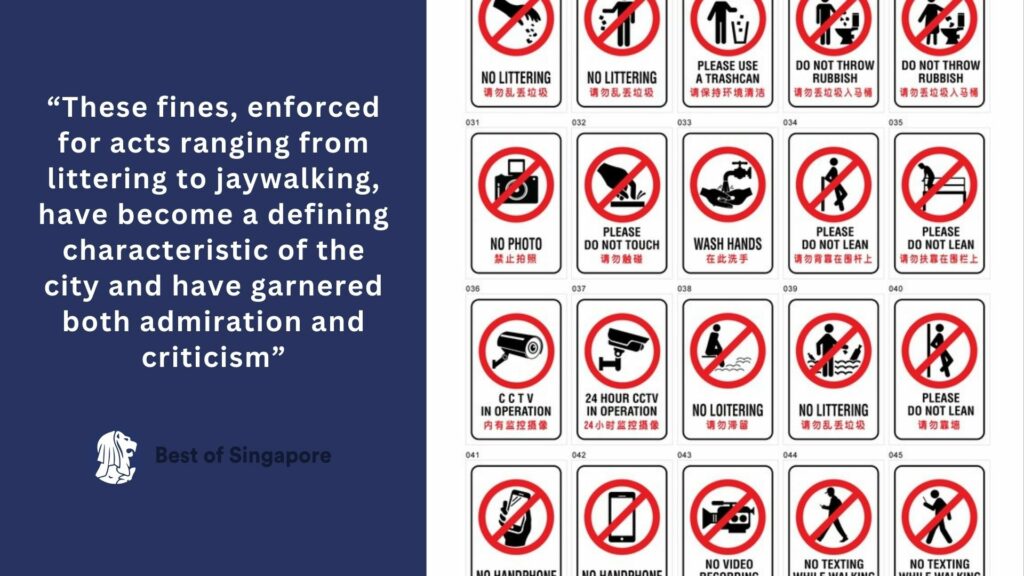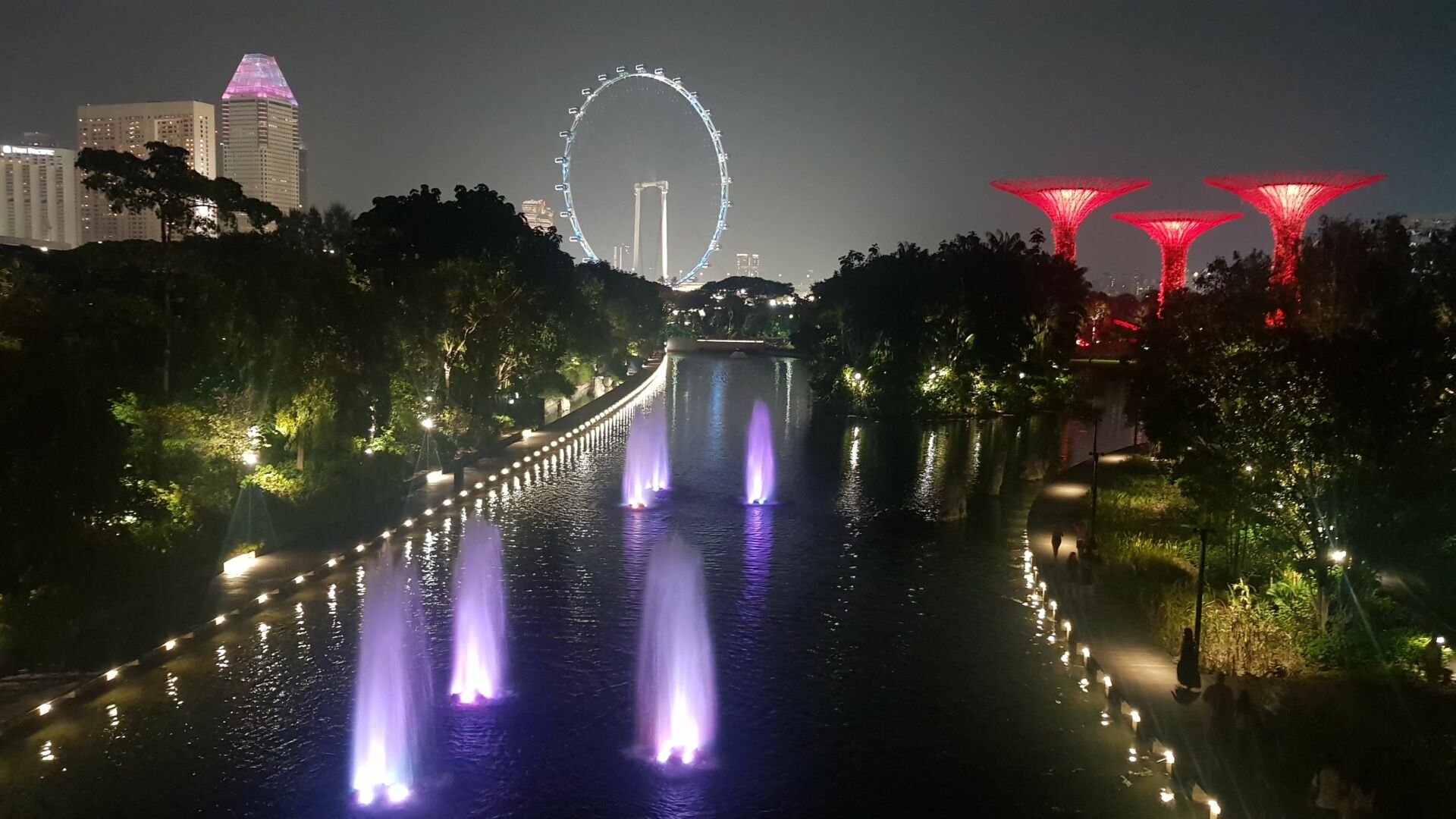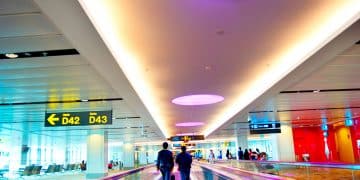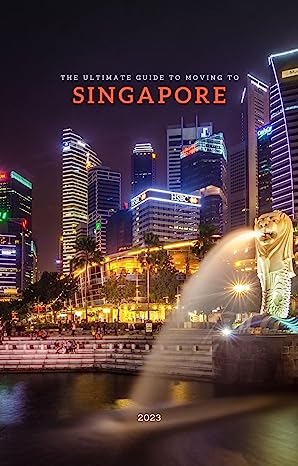You’ve probably heard the term “the fine city” used to describe Singapore, but have you ever stopped to wonder why? What is the story behind this nickname, and what does it reveal about Singapore’s culture and governance?
Singapore is often referred to as “the fine city” due to its strict rules and regulations, which include hefty fines for a variety of offenses, ranging from littering to jaywalking. This nickname has a dual meaning; it not only refers to the fines imposed but also to the fine, or excellent, standard of living that these rules help to maintain.
The origins of the nickname can be traced back to Singapore’s establishment as a city-state and the introduction of strict rules and regulations designed to promote order and cleanliness. These fines, enforced for acts ranging from littering to jaywalking, have become a defining characteristic of the city and have garnered both admiration and criticism. With a unique blend of Asian and Western influences, Singapore’s “Fine City” moniker captures its essence as a place where order and prosperity go hand in hand.
As the nation continues to grow and evolve, understanding why Singapore has earned this nickname and how to navigate its intricate set of rules has become more important than ever. From historical context to present day regulations, learning about Singapore as a “Fine City” provides valuable insight for both residents and visitors alike.

Key Takeaways
- Singapore is known as the “Fine City” for its strict rules and high standard of living
- The nickname has historical roots and reflects the city’s unique cultural blend
- Understanding the meaning behind Singapore’s moniker helps residents and visitors navigate local practices and legislation.
Historical Background
Singapore’s history is a fascinating tale of growth and prosperity, with its origins tracing back to the early 14th century. According to the Malay Annals, Singapore was founded by a prince from Palembang who named the city “Singapura,” which means “Lion City” in Sanskrit. The name reflects the city’s prominence as a key trading and maritime centre in the region, with its strategic location at the southern tip of the Malay Peninsula near the Strait of Malacca.
During the 18th and 19th centuries, various groups such as the Bugis and Europeans began to establish a presence in Singapore. However, it was the arrival of the British in 1819 that proved to be a turning point for the city. In that year, Sir Stamford Raffles established a British trading post on the island, helping transform Singapore into a vital port and gateway to the wider world. The British also used Singapore to consolidate their influence in the region, eventually incorporating it as part of their crown colony of Malaya.
Singapore’s role as a regional hub continued to grow throughout the 19th and early 20th centuries, with its port becoming one of the busiest in the world. However, the city’s prosperity was severely interrupted by the outbreak of World War II, during which Singapore was invaded and occupied by Japanese forces from 1942 to 1945. This period of hardship had a profound impact on Singapore and its people, shaping the city’s future development in the years following the war.
Today, Singapore is known as a “fine city” for several reasons. The term conveys a double meaning, reflecting both the city’s impressive achievements in terms of economic growth, modern infrastructure, and high living standards, as well as its strict rules and regulations aimed at maintaining social order and cleanliness. With its rich historical background and unique blend of cultural influences, Singapore has evolved into a global city that continues to thrive at the crossroads of the East and West.
Despite the challenges and setbacks experienced throughout its history, Singapore has demonstrated a remarkable capacity for resilience and adaptation. With its advantageous location at the southern extremity of the Malay Peninsula, flanked by the Pacific and Indian Oceans, Singapore has managed to capitalise on its position as a strategic regional hub and free port, following the vision illuminated by the light of the south.

Singapore: The Fine City
Singapore, often referred to as the “Fine City,” is known for its impeccable cleanliness and strict rules, which contribute to its reputation as a clean and green environment. The nickname “Fine City” has a double meaning – it represents Singapore as an exceptional place to live, work, and visit, as well as referring to the fines imposed for violating its rules.
One of the main reasons behind Singapore’s cleanliness is its rigorous campaign against littering, which is enforced by the government. Additionally, the city has progressive waste management and recycling systems in place, contributing to its “Garden City” image. Extensive parks and green spaces are common throughout the city, fostering a sustainable urban environment.
Singapore’s housing and transport systems are also notable, as they play a significant part in preserving the city’s reputation. Public housing in Singapore is well-maintained, with residents taking pride in their homes. The efficient public transport system, which includes buses, trains, and taxis, minimises traffic congestion and lowers air pollution levels.
When it comes to food and drink, Singapore’s residents and visitors have a wide array of options. The city is famous for its hawker centres, providing access to a variety of food from different cultures at affordable prices. However, it’s important to follow the regulations, such as no smoking or drinking in public areas, as violating these rules can lead to fines.
Singapore’s dedication to cleanliness, sustainable living, efficient housing and transportation, and its vibrant food culture collectively contribute to its status as the Fine City. By adhering to strict rules and regulations, the people in Singapore have managed to create a clean and green environment and maintain a standard of living that other cities can aspire to emulate.

Singapore Regulations and Legislation
Singapore is often referred to as “The Fine City” due to its strict rules and regulations, which contribute to the city’s clean and orderly environment. The government of Singapore enforces various laws to maintain its immaculate condition while ensuring the safety and well-being of both residents and visitors.
One of the key aspects of Singapore’s legal system is its stringent regulations for a wide range of activities, such as littering, smoking in public places, jaywalking, and failing to flush toilets after use. These rules are coupled with heavy fines to discourage non-compliance and to keep the city clean and orderly.
In addition to cleanliness, Singapore takes crime and corruption very seriously. It is well known for its low crime rates, which contributes to its reputation as a safe and secure country. This is a result of the government’s firm stance against corruption, manifested in the enforcement of strict laws and the use of severe penalties, such as caning and the death penalty, for serious offences.
The death penalty is instated in Singapore for certain crimes, including drug trafficking, murder, and firearms offences. This strict approach to fighting crime has deterred illegal activities, making it challenging for criminals to operate within the country.
Caning is another form of corporal punishment used in Singapore. It is typically reserved for male offenders convicted of crimes such as vandalism, sexual assault, and repeat drug consumption. These strict penalties serve as an effective deterrent, further reinforcing the nation’s commitment to maintaining a lawful and secure environment.
Through effective legislation and stringent enforcement, Singapore has successfully maintained its reputation as “The Fine City” while ensuring a high level of safety and low crime rates for its citizens. The various laws and regulations in place encourage responsible behaviour among residents, resulting in a clean, secure, and orderly society.
Unique Local Practices In Singapore
Singapore, often referred to as the “Fine City”, has a reputation for its cleanliness and strict rules. This title refers to both the high quality of life and the fines imposed for various offences. Some unique local practices in the city-state contribute to its cleanliness and orderliness. The following paragraphs showcase these practices with a focus on chewing gum, spitting, littering, and walking.
Chewing gum sales are banned in Singapore to maintain cleanliness, with very few exceptions. This ban has been in place since 1992, and the objective is to prevent gum-related littering, such as gum sticking to public facilities or pavements. Although chewing gum itself is not illegal, importing or selling it can result in hefty fines. The only exceptions to this rule are for medicinal and dental purposes.
Spitting in public places is another activity that the Singaporean government strictly forbids. This act is seen as unhygienic and disrespectful, and offenders can face fines if caught. The authorities enforce these rules to keep the city’s streets and walkways clean and maintain a high standard of public health.
Littering is heavily penalised in Singapore. Residents and visitors are encouraged to dispose of their waste properly in designated bins. Enforcement officers patrol the streets, and individuals caught littering can face substantial fines, community service, or corrective work orders. The strict enforcement of anti-littering laws contributes to Singapore’s reputation as one of the cleanest cities globally.
Lastly, walking in Singapore is an enjoyable and hassle-free experience due to the well-maintained pavements and pedestrian pathways. Authorities emphasise cleanliness and safety for pedestrians, ensuring that walkways remain clear and free from litter or other obstructions. In addition, pedestrians are encouraged to follow traffic rules and signs, contributing to orderly and efficient pedestrian movement throughout the city.
Overall, Singapore’s unique local practices help maintain its clean and orderly appearance, earning it the nickname “Fine City”. The strict rules and fines in place contribute to a high quality of life for residents and visitors alike, making Singapore an attractive destination to live, work, and invest in.
The Genesis of the “Fine City” Moniker: A Look at Singapore’s Strict Laws
The Role of Discipline in Maintaining Order
Singapore’s government prioritizes cleanliness and orderliness in the city-country. Since its citizens’ early ages, they’re taught about proper behavior and the importance of being considerate towards others. This fosters a disciplined society, ensuring that everyone contributes to maintaining an organized and pleasant environment.
The Story Behind the Chewing Gum Ban In Singapore
Although chewing gum itself isn’t illegal in Singapore, importing it in large quantities is. The ban was established to prevent gum-related disruptions in public spaces and the city’s infrastructure. Visitors should be cautious about bringing chewing gum into the country to avoid fines or possible imprisonment.
Extra Resources:
What Are The Reasons For The Chewing Gum Ban In Singapore?
Why Is Chewing Gum Banned In Singapore?
Anti-Littering Laws: Keeping the Streets Clean
One of Singapore’s key cleanliness measures is the strict enforcement of anti-littering laws. Litterbugs may face hefty fines, and repeated offenders may receive Corrective Work Orders (CWO), during which they must clean public spaces while wearing a bright-colored vest. These regulations ensure that Singapore’s streets remain pristine and appealing to both residents and visitors.
Regulations on Smoking: Where Can You Light Up?
Singapore has strict regulations concerning smoking in public areas that aim to promote clean air and protect non-smokers from the effects of second-hand smoke. Designated smoking areas are available, but smoking outside these areas can result in fines. Visitors must respect these limitations to avoid penalties and contribute to a healthier environment.
Extra Reading:
Can I Vape in Singapore? Your Guide to Vaping Laws and Regulations
Jaywalking: Why It’s a No-No
Due to the importance of pedestrian safety and maintaining order, jaywalking is strictly prohibited in Singapore. Violators can face fines, and adhering to traffic rules and designated crossing points ensures a safe and organized flow of both pedestrians and vehicles.
Elevator Etiquette: From Urinating to Flushing Toilets
In Singapore, not flushing public toilets and urinating in elevators can lead to fines of up to S$500. Sensors in elevators even detect urine and automatically lock the doors until authorities arrive. This strict approach to cleanliness creates a more pleasant experience for all who frequent public spaces.
Is Spitting Illegal in Singapore?
Spitting is considered a public nuisance in Singapore and is penalized with fines. The country enforces this rule to maintain its cleanliness standards, and visitors should be aware of this regulation to avoid consequences.
The Consequences of Vandalism
Vandalism is strictly punished in Singapore, and those caught can face fines, imprisonment, or even caning. This stringent approach helps preserve the city’s aesthetic appeal and demonstrates the government’s commitment to maintaining a pristine environment.
Singapore’s Zero-Tolerance Policy on Drugs
Possessing, trafficking, or manufacturing drugs can result in severe penalties in Singapore, including the death sentence for larger quantities. This strict policy has contributed to the country’s low crime rates and serves as a strong deterrent to drug-related activities. Visitors must be aware of these rules and avoid any involvement with drugs while in the city.

Navigating the Dos and Don’ts of Singapore: A Guide for Residents and Visitors
Understanding the Local Queuing Culture
In Singapore, forming orderly queues is highly valued for various daily activities like ordering food or boarding a train. It is important to observe the behaviour of locals and join queues rather than cutting in line, which is frowned upon.
Respecting the Elderly: A Cultural Imperative
Singaporeans show deep respect for the elderly, referring to older individuals as ‘Aunty’ and ‘Uncle’. Demonstrating courtesy and addressing them appropriately is an essential cultural norm in Singapore.
Cash Transactions: What You Need to Know
Although Singapore is technologically advanced, cash is still commonly used in the city, especially in smaller neighbourhood shops and hawker centres (food halls). It is advisable to have some local currency on hand for such transactions.
The Safety of Drinking Tap Water in Singapore
Due to Singapore’s commitment to cleanliness, the tap water is held to a high standard of safety and is safe for consumption for both locals and visitors. Most restaurants and dining options provide free tap water to customers, ensuring everyone stays hydrated in the tropical climate.
A Guide to Singapore’s Famous Hawker Centres
Singapore’s hawker centres are renowned worldwide for their diverse range of cuisine and affordable prices. These eating establishments showcase various cultures and culinary traditions, offering a unique and enjoyable dining experience. Visitors are encouraged to take advantage of these food centres to savour the medley of food cultures in the region.
Extra Resources:
The 6 Best Hawker Centers In Singapore
Do Singaporeans Like Hawker Food?
Cultural Norms Around Cleanliness and Hygiene
Singapore places significant emphasis on cleanliness, which requires the cooperation of everyone in the city. For example, removing shoes before entering someone’s home or a place of worship is a common practice expected of all residents and visitors. It is essential to observe and adapt to local customs to respect the cultural expectations on cleanliness.
Table-Choping: A Unique Singaporean Phenomenon
In crowded eating spaces like hawker centres, locals often reserve tables by placing personal items such as tissue packs, umbrellas, or water bottles on the table. If a table seems occupied by such items, it is best to find another table rather than assuming the objects were left there by accident.
Tipping: Why It’s Not Common in Singapore
Unlike some other countries, tipping is not a customary practice in Singapore as the Goods & Service Tax is automatically added to every bill. This tax serves as the equivalent of a tip, eliminating the need for additional tipping in restaurants and other hospitality establishments.

Avoiding Fines: What Not to Do in Singapore
Singapore is known as the “Fine City” due to its strict enforcement of laws and regulations, resulting in a clean, safe, and orderly environment. As a visitor to Singapore, it’s essential to be aware of these rules to avoid getting fined. This section will cover some of the most important laws related to alcohol consumption and cigarette importation.
The Strict Alcohol Laws You Should Be Aware Of
Singapore has stringent alcohol regulations in place to maintain public order. Here are some critical points to keep in mind:
- Alcohol consumption in public places: It is illegal to consume alcohol in public places between 10:30 PM and 7 AM. This law applies to all outdoor spaces, such as parks, beaches, and sidewalks.
- Liquor sales: Alcohol sales are also prohibited from 10:30 PM to 7 AM at retail outlets. If you wish to buy alcohol, make sure to do so during the allowed hours.
- Drinking age: The legal drinking age in Singapore is 18 years old. Ensure that you are of the appropriate age and can provide identification if required before purchasing or consuming alcohol.
- Drunk and disorderly behaviour: Public intoxication and causing disturbances are offenses that can lead to fines, imprisonment, or both. It’s essential to drink responsibly and maintain self-control, even when consuming alcohol in private spaces such as bars or clubs.
Importing Cigarettes: What You Need to Know
Singapore enforces strict regulations on cigarette importation to control tobacco use and establish a healthy environment. Here are essential points to be aware of:
- Duty-free allowance: Singapore does not allow duty-free cigarettes to be brought in by travellers. Any cigarettes or other tobacco products must be declared to Singapore Customs upon arrival, and the appropriate taxes must be paid.
- Illegal cigarettes: Importing or selling illegal cigarettes is a severe offense in Singapore. Offenders can face heavy fines and even imprisonment.
- Smoking restrictions: Smoking is not permitted in most indoor public spaces and certain outdoor areas like parks, bus stops, and playgrounds. It’s essential to look out for no-smoking signs and follow the rules to avoid fines or penalties.
To make the most of your time in this incredible city, familiarise yourself with Singapore’s laws and avoid any actions that could potentially result in fines. Stick to these guidelines, and you’ll be free to enjoy Singapore’s beauty and attractions without any hassle.
Decoding the “Fine City”: Understanding the Monetary Penalties
A Breakdown of the Fines for Common Offences
Singapore, popularly known as the “Fine City”, has stringent rules and regulations in place to maintain its cleanliness, safety, and orderliness. In this section, we will provide a brief overview of some common offences and their corresponding monetary penalties.
- Chewing gum: Importing and selling chewing gum is prohibited in Singapore, and violating this ban can result in a fine of up to SG$1,000.
- Littering: Discarding waste materials in public places is a major offence in Singapore and can cost a fine of SG$1,000.
- Smoking: Smoking in prohibited areas can result in a fine of SG$1,000. This includes indoor public spaces and certain outdoor spaces like bus stops.
- Bird feeding: To maintain cleanliness and prevent pest infestations, Singapore prohibits feeding birds in public places. The fine for this offence is SG$1,000.
- Eating and drinking in public places: Consuming food or beverages on public transportation or places like train stations is not allowed. Violators can be fined SG$500.
- Carrying flammable goods: Transporting hazardous materials without proper authorization can result in a hefty fine of SG$5,000.
These monetary penalties are just one aspect of the punishment for breaking the law in Singapore. Other consequences may include community service or even imprisonment, depending on the severity of the offence.
How to Avoid Getting Fined in Singapore
While visiting or living in Singapore, adhering to the rules can save you from encountering monetary penalties and legal trouble. Here are some steps to avoid getting fined:
- Stay informed: Familiarise yourself with Singapore’s laws and regulations before your visit. Read up on the common offences and their consequences, so you are aware of what is expected from you.
- Observe signage: Pay attention to signs that indicate the rules and guidelines in various areas, such as “No Smoking” signs or littering prohibitions. Following these directives will help you abide by the law.
- Ask for guidance: If you are unsure about a specific rule or situation, seek assistance from locals or authorities, who can guide you in the right direction.
- Be considerate: Show respect for the environment and people around you by maintaining cleanliness, observing noise restrictions, and avoiding antisocial behaviours.
- Adopt safe practices: Whether it’s crossing the road at designated spots or transporting items according to regulations, adhere to safety standards to prevent accidents and avoid fines.
By following these steps and being aware of the local laws, you can enjoy your time in Singapore without the worry of incurring fines or facing legal issues. Remember, the key to a smooth experience in the “Fine City” is being informed, respectful, and diligent in following the rules.
Why Is Singapore Called The Fine City? – Frequently Asked Questions
What makes Singapore’s laws so strict?
Singapore’s laws are strict due to the government’s emphasis on maintaining cleanliness, orderliness, and promoting a harmonious society. These strict laws ensure that the country remains a safe and pleasant place for residents and visitors alike.
How do fines contribute to Singapore’s orderliness?
Fines play a significant role in maintaining orderliness in Singapore. They act as a deterrent, discouraging individuals from engaging in activities that can cause disturbance or negatively affect public spaces. The fear of high fines helps to keep the city clean, organized, and free of public nuisances.
What are some common fines imposed in Singapore?
Some common fines in Singapore include those related to littering, smoking in prohibited areas, jaywalking, and vandalism. These fines serve to maintain the cleanliness and tidiness of public spaces, ensuring that the environment remains pleasant for everyone.
In what ways do Singapore’s laws impact travelers?
Singapore’s laws can impact travelers in various ways. Visitors need to be aware of the regulations governing smoking, littering, and public behaviour to avoid fines. It is essential for travelers to research and familiarize themselves with these rules and respect local customs and regulations.
Are there any unusual laws in Singapore?
Singapore has some unusual laws such as the ban on chewing gum sales, feeding pigeons in public, and walking around your own home naked with visible exposure to the outside. These laws, although strange to some, contribute to the overall cleanliness and orderliness of the city.
How does the legal system enforce these fines and punishments?
The legal system in Singapore enforces fines and punishments through the police and other regulatory authorities. Offenders who are caught breaking the law may be required to pay a fine on the spot, or they may be issued a notice requiring them to appear in court.
Is it OK to kiss in public in Singapore?
While public displays of affection, such as kissing, are not illegal in Singapore, they may be frowned upon by some locals, given the cultural context. It is essential to be respectful and considerate of local customs and sentiments while visiting Singapore.




